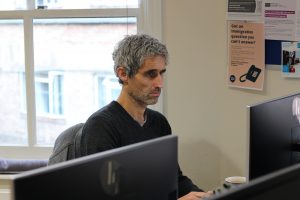Good result for Fitzrovia residents
Citizens Advice Westminster’s unique Licensing Advice Project, funded by Westminster City Council since 2005, dealt with 163 new enquiries during its reporting year ended 31 March, compared with 138 the year before.
The project’s solicitor Richard Brown represented residents at 47 hearings and made written submissions for 9 hearings. He also advised on 17 cases where representations were withdrawn following agreement with the applicant. There were a further 6 cases where the application was withdrawn after representations had been made and 19 cases where no objections were made after taking advice.
The project provided information, assistance, advice and representation on the following types of applications in 2018-19: new and variation of licenses, applications for new or renewals of entertainment licenses, and an application for the transfer of a betting shop licence.
Level of work
“No two cases are the same,” comments Richard. “For advice on applications for licences, some clients simply request information on an application or issue and do not require further assistance. More usually, clients require more detailed advice on an application and how best to frame their objections. Casework therefore tends to comprise three broad stages of information; ongoing assistance and advice; representation at licensing committee hearings and any necessary follow-up.”
In 2018-19, the project represented residents (ranging from a single individual to multiple residents, amenity societies and residents’ associations) at 47 licensing hearings. The project was also asked to represent residents at a number of hearings which were either not necessary following withdrawal of representations after negotiations and agreement, or where the application was withdrawn, or where it was not possible to attend the hearing but instead submitted written representations in advance of the hearing.
The project also contributes to the bureau’s social policy work, collecting client evidence, locally and nationally, to campaign for change to policy and practice. Social policy work in the context of the Licensing Advice Project can include: cases where the impact of the advice given is wider than the individual to whom the advice is given, or cases which set a precedent that has a wider impact than the individual case itself. As Richard explains:” We have assisted residents’ associations/amenity societies, or individual residents who are themselves acting on behalf of other residents, or a resident shares the advice with other residents.
“We also contribute to social policy work through dissemination of useful information about Westminster Council procedure/best practice, either through the website, by emailing amenity societies, or by informing individual clients as appropriate.
Better conditions achieved for Fitzrovia residents
One particular application this year exemplifies the way the service can be tailored to the specific requirements of the clients and delivered at different levels to both individuals and residents’ groups.
The application sought a licence permitting sale of alcohol for consumption on and off the premises; recorded music; live music; and late night refreshment, up to a terminal hour of 12.30am. The plans submitted with the application showed tables and chairs outside the premises building and openable windows. There was no condition proposed that sale of alcohol would be ancillary to a table meal, as would be usual with a restaurant. No opening hours were given – the relevant box was not filled in. This was a serious deficiency in the application. The Operating Schedule appeared to be largely boilerplate, and some of it seemingly suited to a different type of premises.
Richard arranged a meeting with a number of residents to discuss the best coordinated approach for them to take. As a first step, he advised on the various aspects of the application and provided advice on points residents might wish to address in representation For example residents were not convinced that the applicant had advertised the application correctly as there was no ‘blue notice’ on display at the premises. They were advised them to inform the licensing authority, who performed a check and agreed. The consultation period for the application was therefore reset.
Richard drafted representations for residents, and they completed them as they saw fit, giving their views on the different elements of the application and conditions. The main elements of concern were: commencement and terminal hours; restricted use of outside space; type of licensable activity; noise emanation; and servicing (deliveries/collections/refuse disposal). Residents requested an earlier terminal hour and later commencement time; no tables and chairs outside; amended times for servicing; safeguards relating to noise emanation, and to private events; no takeaway/delivery service; and ‘restaurant’ conditions throughout the premises.
Once representations had been submitted, Richard advised on further queries as necessary. The applicant’s solicitors made some amendments to the application following discussions with the police and Environmental Health. The proposed terminal hour was reduced, and live and recorded music was withdrawn.
Richard explains the process: “I met residents again prior to the hearing to finalise the best approach.When the hearing took place, we spoke with the applicant’s representatives prior to the hearing to confirm which issues were in dispute. We formally represented 18 residents, a leasehold management company and an amenity society. The applicant was represented by Counsel.
“The hearing was lengthy. A number of residents were present, from different residential blocks. We spoke to residents prior to the hearing, confirming the position on behalf of those I was directly representing, and confirming that it met with universal approval. We presented the residents’ case to the Licensing Sub-Committee and took them through the issues in dispute and our proposals. There was a great deal of discussion between the parties.”
Conditions amended and hours reduced
The application was granted, but with amended conditions and the sale of alcohol was reduced to below ‘core hours’. The Sub-Committee also required the applicant to submit a revised licence plan.
“Residents were very happy with the outcome,” comments Richard who also points out:”This was a good example of how the project can advise, assist and represent a large number of residents who require/request differing levels of service. In this case, the service provided ranged from simple provision of information for some residents to complex and detailed advice, drafting submissions, meetings with various parties, and representation at the hearing for others.
“We were able to ‘prep’ all the residents who attended the hearing, whether or not we were actually representing them, and provide clarifications and assistance.
“We look forward to providing a tailored, timely, specialist, practical and pragmatic advice service in the forthcoming year ahead. For further information read the annual report and visit the dedicated Website: www.licensingadvice.org.uk

